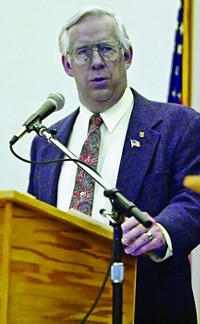Advertisement
Grab your lab coat. Let's get started
Welcome!
Welcome!
Create an account below to get 6 C&EN articles per month, receive newsletters and more - all free.
It seems this is your first time logging in online. Please enter the following information to continue.
As an ACS member you automatically get access to this site. All we need is few more details to create your reading experience.
Not you? Sign in with a different account.
Not you? Sign in with a different account.
ERROR 1
ERROR 1
ERROR 2
ERROR 2
ERROR 2
ERROR 2
ERROR 2
Password and Confirm password must match.
If you have an ACS member number, please enter it here so we can link this account to your membership. (optional)
ERROR 2
ACS values your privacy. By submitting your information, you are gaining access to C&EN and subscribing to our weekly newsletter. We use the information you provide to make your reading experience better, and we will never sell your data to third party members.
Environment
Bad Science Awards
by Aalok Mehta
February 7, 2005
| A version of this story appeared in
Volume 83, Issue 6
Mangled chemistry once again played a large role in Ben Goldacre's annual Bad Science awards. Goldacre, who writes a column on mishandled science for the U.K. newspaper the Guardian, announced the unfortunate winners in December.
There were a number of candidates for his "Andrew Wakefield prize for preposterous extrapolation from a single unconvincing piece of scientific data." Wakefield's claim to infamy arises from a 1998 study he published in the Lancet suggesting a link between autism and bowel disease associated with MMR (mumps, measles, and rubella) vaccines. His evidence was tenuous at best, and he has yet to convince the medical community of his case.
Goldacre lambasted an article by the Sunday Times that claimed reishi mushrooms reduced the pain of postherpetic neuralgia in trials; no paper was cited, and the only reference Goldacre could dig up was an experiment involving four patients and no control group [Am. J. Chin. Med., 26, 375 (1998)]. And the Daily Mail was highlighted for spurious articles on the Atkins diet and anti-MMR crusaders.
In the end, though, top honors went to the Daily Express for a piece citing the protective aspects of turmeric against cancer, particularly prostate cancer, "on the basis of laboratory studies into the effects of a chemical extract on individual cells in dishes, and no (zero) trials in humans," Goldacre writes.
(C&EN hasn't been completely blameless when it comes to turmeric, a yellow spice that's a staple in many Asian cuisines. Its active ingredient, curcumin, has been cited in two recent articles: "Curry Compound Shows Promise as a Drug" [C&EN, April 26, 2004, page 9] and "How Curry Combats Cancer" [C&EN, Sept. 1, 2003, page 8]. Both articles tout curcumin's cancer-fighting prowess, even though the compound is still only in Phase I clinical trials on the basis of in vitro studies showing it irreversibly inhibits an enzyme associated with angiogenesis.)
A number of products were mentioned in the "Bad Science product of the year" category. Of note were SPES capsules, an herbal prostate health concoction found by the Food & Drug Administration to be contaminated with prescription drugs; the Durex Performa, a condom containing the local anesthetic benzocaine; and Cussons' Carex, a soap claiming to remove bad bacteria from hands while leaving the good behind. The biggest prize, though, went to the Space Tomato Number One, a plant producing tomatoes almost 1 kg in weight. The Chinese government claims the plant is the result of a "space breeding" project involving exposure of plants to increased radiation in orbit. Surely China had some radiation sources available on the ground?
Finally, the "Least plausible cosmetics claim" also contained some items of interest. Valmont's Cellular DNA Complex, made from salmon roe DNA, costs nearly $500 for seven vials and claims to enhance the natural cosmetic properties of DNA, such as moisturizing, protecting, and regenerating the skin. But the winner, Bioionic's Ionic Hair Retexturizing (IHR) system, a hair straightening treatment, takes the cake for kooky explanations.
The product claims that " 'water molecules are broken down to a fraction of their previous size ... diminutive enough to penetrate through the cuticle, and eventually into the core of each hair,' " Goldacre writes. "Shrinking molecules caused some concern among the physicists at the ceremony, since IHR was available just 200 yards away, and the only other groups who have managed to create superdense quark-gluon plasma used a relativistic heavy-ion collider. The prospect of such equipment being used by hairdressers was deemed worthy of further investigation."
Since Goldacre's piece, Bioionic's product description has been changed; it now reads more innocuously: "Natural negative ions break water molecule clusters into micro-fine particles, allowing the formula to easily penetrate the hair shaft and effectively straighten the hair without breaking the hair's internal structure. Leaves hair soft, smooth, shiny, and silky straight."
Goldacre passed on awarding the "Charles Darwin memorial prize for most unlikely death sustained while credulously being treated by a transparently fraudulent alternative therapist."
This week's column was written by




Join the conversation
Contact the reporter
Submit a Letter to the Editor for publication
Engage with us on Twitter